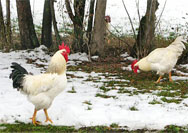Sheds Collapse Under Weight of Snow
In the aftermath of the recent record-breaking snowstorms that hit the East Coast, it is being reported that the roofs of up to 50 chicken sheds throughout the Delmarva Peninsula in Delaware and Maryland have collapsed under the weight of the snow. As a result, thousands of birds have likely suffered and died in the rubble of these buildings.
These storms were predicted well in advance, which means that farm operators had ample time to figure out how to deal with the snowfall. All responsible farmers should always have an emergency evacuation plan in place for situations like this one. Now, we’re writing to Delaware and Maryland officials urging them to investigate and insisting that cruelty-to-animals charges be brought if evidence is found to warrant them. If some farm operators did nothing to prevent the roof collapses or to evacuate the chickens, and any animals died as a result of their inaction, then those farmers are directly responsible for the animals’ deaths.
The best way to prevent fatal accidents like this? Decrease the demand for chickens and other farmed animals by going vegan.
Written by Logan Scherer


